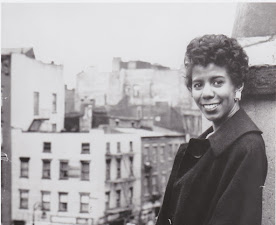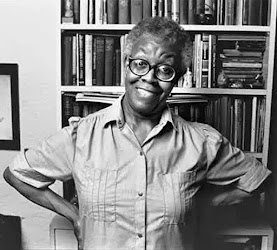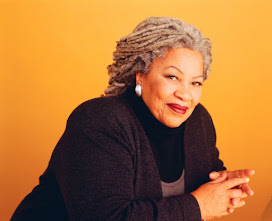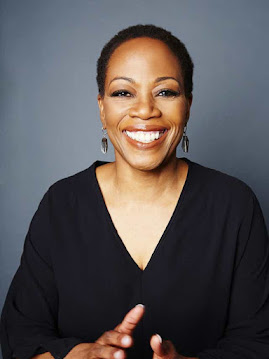Happy Black History Month! February is dedicated to recognizing significant Black figures in the United States and the many contributions they have made throughout history. Here at the Rock Hill Public Library, we’re delighted to celebrate the many Black authors who have made the literary world great. Take a look at these 15 remarkable writers, and check back on our blog every week in February to see more posts honoring Black authors!
1. Eric Jerome Dickey (July 7, 1961-January 3, 2021)
Eric Jerome Dickey didn’t always dream of becoming a writer. Dickey, who was born and raised in Memphis, Tennessee, originally moved to Los Angeles at 22 to pursue an engineering career. After moving to this new city, he was exposed to the arts in a way he never had been before and was inspired to follow a new path. He immersed himself in new experiences and dabbled in acting and comedy before falling in love with writing. One of Dickey’s friends convinced him to take a writing class, where he started creating poetry and short stories. He published his first short story less than a decade after arriving in LA and his first full-length novel, Sister, Sister, hit the market two years later. He quickly gained a nationwide fanbase following the novel’s success and became one of the few men to break into the female-dominated African-American fiction genre. Sadly, Mr. Dickey passed away from cancer last month at 59. With his passing so fresh in readers’ minds, it’s fitting that his legacy is the first to be celebrated on our list. The beloved author’s final project, The Son of Mr. Suleman, is set to be released April 2021.
Notable works: Friends and Lovers, Milk in my Coffee, Cheaters, Before We Were Wicked, The Business of Lovers
2. Lorraine Hansberry (May 19, 1930-January 12, 1965)
Notable works: A Raisin in the Sun, The Sign in Sidney Brustein’s Window, Les Blancs (published posthumously)
3. Zora Neale Hurston (January 7, 1891-January 28, 1960)
Notable works: Their Eyes Were Watching God, Jonah’s Gourd Vine, Tell My Horse, Dust Tracks on a Road, Barracoon (published posthumously)
4. Jason Reynolds (December 6, 1983—)
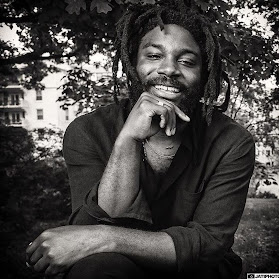 Young adult novelist Jason Reynolds has touched the hearts of many, though his path to becoming a published author wasn’t always clear. As a young boy in Maryland, Reynolds found inspiration in rap music to write poetry. Poetry became his main focus for almost two decades and much of his time was spent reading and writing. Though he loved reading poetry, Reynolds didn’t read a full-length novel cover to cover until he was 17. Once he did, he was hooked and and began reading every book by African-American authors he could get his hands on. He had some initial success publishing his poetry but his later attempts floundered. Around this time, he was also rejected from several M.F.A. programs due to his poor college grades. Discouraged, Reynolds quit writing and focused on working in retail until one of his friends, the son of author Walter Dean Myers, encouraged him to read one of his father’s books for inspiration. Reading The Young Landlords by Walter Dean Myers inspired Reynolds to pick up a pen again, and thus When I Was the Greatest, his first novel, was born. He’s written almost a dozen novels since 2014 and inevitably returned to poetic verse with Long Way Down in 2017. Reynolds first and foremost writes for Black children and intentionally includes portrayals of Black boys being vulnerable and experiencing a full range of human emotions so that, through his work, some children are able to see themselves reflected in literature for the first time. Though he may write for adults one day, Reynolds considers connecting with kids on the page his primary focus.
Young adult novelist Jason Reynolds has touched the hearts of many, though his path to becoming a published author wasn’t always clear. As a young boy in Maryland, Reynolds found inspiration in rap music to write poetry. Poetry became his main focus for almost two decades and much of his time was spent reading and writing. Though he loved reading poetry, Reynolds didn’t read a full-length novel cover to cover until he was 17. Once he did, he was hooked and and began reading every book by African-American authors he could get his hands on. He had some initial success publishing his poetry but his later attempts floundered. Around this time, he was also rejected from several M.F.A. programs due to his poor college grades. Discouraged, Reynolds quit writing and focused on working in retail until one of his friends, the son of author Walter Dean Myers, encouraged him to read one of his father’s books for inspiration. Reading The Young Landlords by Walter Dean Myers inspired Reynolds to pick up a pen again, and thus When I Was the Greatest, his first novel, was born. He’s written almost a dozen novels since 2014 and inevitably returned to poetic verse with Long Way Down in 2017. Reynolds first and foremost writes for Black children and intentionally includes portrayals of Black boys being vulnerable and experiencing a full range of human emotions so that, through his work, some children are able to see themselves reflected in literature for the first time. Though he may write for adults one day, Reynolds considers connecting with kids on the page his primary focus. Octavia Butler grew up devouring science fiction and fantasy novels. As a shy child, the would-be author found solace in her local library in Pasadena and began writing her own stories at a young age. Butler’s mother bought a typewriter for her when she was 10, and the budding author dove headfirst into what would become a lifelong career. Even at a young age, she quickly became frustrated with the lack of diversity in speculative fiction and set out to fill the void, intentionally writing herself into her stories to reflect the diversity of the world around her. Butler’s writing career began in earnest in the 1970s. She worked odd jobs that enabled her to support herself and devote the bulk of her time to writing. She had some difficulty finding success but started to gain traction when she stopped mirroring other sci-fi greats and developed her own voice. Butler published the first installment of her Patternist series in the late 1970s, and she soon stopped working her temporary jobs as she was able to live on her writing income. Critics took notice of her unique writing style, particularly her ability to weave stark realistic social criticisms into seemingly unrealistic plots, and her position as a highly influential figure in the sci-fi canon was quickly solidified. She received the Hugo and Nebula awards numerous times and became the first science fiction author to receive a MacArthur Fellowship in 1995. Though Butler was a critically-acclaimed author, she remained relatively unknown to a wider audience for most of her career. Interest in her work started to grow after the release of her last standalone novel, Fledgling, but she only became more widely recognized after her death in 2006. Her work is now taught at over 200 universities and her novel Kindred was recently adapted into a graphic novel. Though Butler is no longer around, fans still have something to look forward to in the coming years—director Ava DuVernay is developing a television adaptation of Dawn, and a Patternist series is also in the works. A true visionary, Butler’s work lives on as she continues to inspire people from all walks of life.
Notable works: Patternmaster, Kindred, Bloodchild and Other Stories, Fledgling
Roxane Gay was born to Haitian-American parents in Omaha, Nebraska. From a young age, Gay turned to reading and writing for comfort. She began using the written word as an avenue for healing after surviving a vicious assault at the hands of her peers at only 12 years old. After writing a a series of stories for school featuring girls being gruesomely violated, Gay’s teacher helped her seek counseling but also saw her raw talent and encouraged her to continue writing. She experienced some setbacks while attempting to complete her undergraduate degree, including dropping out her junior year to pursue a long-distance relationship, but pushed through and eventually earned her PhD. She began teaching at universities in 2010 and also became editor of Bluestem magazine around this time. Gay published her first short story collection in 2011, though her writing career really took off in 2014 with the publication of her debut novel, An Untamed State, and her collection of essays titled Bad Feminist. She found even greater success after baring it all in her memoir Hunger: A Memoir of (My) Body in 2017, in which she explores the depths of her trauma and how her assault influenced everything from her weight to her relationships with others. She still writes primarily for herself but now writes to reach others as well. Much of her work has been influenced by her trauma, and she also writes about race, gender, and other social issues. She avoids sticking to one genre so as not to be pigeonholed and has experimented with everything from short stories to comics, and readers can anticipate even more from her in the coming years.
Gwendolyn Brooks was a woman of many firsts. She was the fist African-American to receive a Pulitzer Prize, the first African-American woman to be inducted into the American Academy of Arts and Letters, and the first African-American woman to serve as poetry consultant to the Library of Congress. Born in Topeka, Kansas, Brooks’ family moved to Chicago when she was 6 weeks old. She demonstrated a talent for writing at an early age and published her first poem when she was only 13. By 17 she had published almost 100 poems and also regularly contributed to the Chicago Defender, her local African-American publication. Brooks chose not to pursue a four-year college degree because she knew she wanted to spend her life as a writer. She graduated from a two-year program at Wilson Junior College and worked as a typist until she could support herself on a writer’s salary. She published her first collection of poetry in 1945 thanks to the help of author Richard Wright, who put in a good word for her at Harper & Brothers. Her collection earned critical acclaim and her second book of poetry was published in 1949, for which she won her Pulitzer. Brooks took more of an interest in activism in the middle of her career, and she favored sending her work to small Black publishers over major publishers. She slammed critics for not giving Black publishers enough encouragement and remained a staunch advocate for Black literature for the remainder of her career. Brooks is one of the most widely-read and highly regarded poets of the 20th century. Her work often deals overtly with politics and has an elegant feel to it, yet remains accessible to the average reader. A Chicagoan at heart, Brooks remained there until her death in 2000. Brooks lives on in the hearts of poetry fans everywhere, and she has been immortalized by everything from a commemorative stamp to a statue erected in Gwendolyn Brooks Park in Chicago.
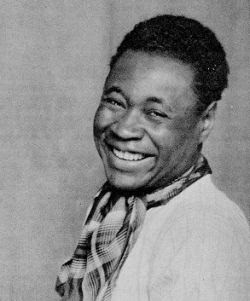 Claude McKay was an influential figure in the Harlem Renaissance movement. Born in Sunny Ville, Jamaica, Festus Claudius McKay developed a strong pride in his heritage. Though he had a strong connection to his culture, he admired English poetry, particularly the later Romantic poets, and blended these poets’ styles with his cultural roots in his work. McKay began writing while still in Jamaica and published two collections of verse in Jamaican dialect in 1912. In that same year, he used award money from the Jamaican Institute of Arts and Sciences to move to the US. He studied at the Tuskegee Institute and Kansas State College before moving to New York City, where he continued to work on his poetry in the midst of the growing art scene in Harlem. McKay published his well-known poem If We Must Die in 1919, which was integral in bringing mainstream recognition to the Harlem Renaissance. Ever devoted to the Romantics, McKay wrote many of his poems in sonnet form. His peers viewed sonnets as antiquated and favored newer poetic forms, but McKay ignored their criticisms and created some of the best-known sonnets of the 20th century. He pushed back against the literary conventions of the time just as he pushed back against restrictive social conventions. The severe racism he endured in Jamaica and the United States provided a basis for much of his work and led to his lifelong dedication to social protest. Though today he isn’t as widely known as other Harlem Renaissance authors, McKay’s work is as relevant as ever. Three of McKay’s novels have been published posthumously, most recently in 2020, which speaks to the timelessness of his work and his ability to move readers long after his passing.
Claude McKay was an influential figure in the Harlem Renaissance movement. Born in Sunny Ville, Jamaica, Festus Claudius McKay developed a strong pride in his heritage. Though he had a strong connection to his culture, he admired English poetry, particularly the later Romantic poets, and blended these poets’ styles with his cultural roots in his work. McKay began writing while still in Jamaica and published two collections of verse in Jamaican dialect in 1912. In that same year, he used award money from the Jamaican Institute of Arts and Sciences to move to the US. He studied at the Tuskegee Institute and Kansas State College before moving to New York City, where he continued to work on his poetry in the midst of the growing art scene in Harlem. McKay published his well-known poem If We Must Die in 1919, which was integral in bringing mainstream recognition to the Harlem Renaissance. Ever devoted to the Romantics, McKay wrote many of his poems in sonnet form. His peers viewed sonnets as antiquated and favored newer poetic forms, but McKay ignored their criticisms and created some of the best-known sonnets of the 20th century. He pushed back against the literary conventions of the time just as he pushed back against restrictive social conventions. The severe racism he endured in Jamaica and the United States provided a basis for much of his work and led to his lifelong dedication to social protest. Though today he isn’t as widely known as other Harlem Renaissance authors, McKay’s work is as relevant as ever. Three of McKay’s novels have been published posthumously, most recently in 2020, which speaks to the timelessness of his work and his ability to move readers long after his passing. Frederick August Kittel, later known as August Wilson, was born in the African-American Hill District of Pittsburgh. Wilson left school at 15 after experiencing intense racism within the school system and began educating himself at the local library and by listening to the wisdom of older Hill District residents. He didn’t let the abuse he endured stop him from achieving his dreams–Wilson earned his high school diploma, became a poet at 20 and co-founded a theater company at 23. He learned everything he could about directing from a book at the library, but held off on writing plays for another decade while he focused on strengthening his body of poetry. Wilson moved to Minnesota in 1978, where his homesickness inspired him to write his first notable play, Jitney. Though this play was one of the first he’d written, it is chronologically the eighth installment in Wilson’s collection of plays called The Pittsburgh Cycle, which he is best known for and includes other popular plays of his like Fences. This series artfully documents the evolving experience of African-Americans in the 20th century. His last play, Radio Golf, premiered a few short months before his death in 2005. Most recently, Wilson’s play Ma Rainey’s Black Bottom was adapted into a movie in 2020. His works explore the experiences of African-Americans and the human condition as a whole, and his sympathetic portrayals of working class folks has earned him many awards and a place in Americans’ hearts for generations to come.
Ta-Nehisi Coates fostered a love of reading and writing at an early age. His mother was a teacher and his father was a librarian and publisher who founded Black Classic Press, and they made sure to expose him to literature early on. He is best known for his sharp examinations of contemporary race issues in our society. Coates has worked as a reporter for multiple publications such as The Washington City Paper, The Village Voice, Philadelphia Weekly, and Time, though his career really began to flourish in 2008 when he started writing for The Atlantic. He gained national attention for his first article published in The Atlantic, which was a biting criticism of Bill Cosby. He has steadily gained national attention for his vivid and passionate writing, and his readers have come to expect his blunt, thoughtful opinion pieces. His first book, a memoir, was published in 2008 and he has since branched out to fiction, including a comic series starring the Black Panther and a novel that was released in 2019. Coates is currently working on multiple projects, including television and film adaptations that will fascinate and educate his fans for years to come.
Not much is known about Countee Cullen’s early life. He was born in either Kentucky, Maryland, or New York, and his guardian for most of his youth was possibly his paternal grandmother. When she died in his teens, Cullen was adopted by and moved in with a prominent minister in Harlem, though the adoption may not have been official. As a teen, Cullen became heavily invested in the arts. He edited his high school’s newspaper and literary magazine and won a city-wide competition for his poetry. After graduating from New York University, the young star released his debut volume of poetry. Cullen kept his finger on the artistic pulse of the city throughout his young adulthood, and his poetic style reflected the vibrant modernism around him. He rose to fame during the Harlem Renaissance and became central to the literary movement through his brave confrontation of oppression in his work. His style encapsulated the various influences throughout his life; his informal education had strong ties to African-American culture and his formal education was deeply rooted in white values. Though he is celebrated now for incorporating both sides of himself in his works, Cullen’s contemporaries often criticized him for playing it safe and many did not appreciate his ability to blend seemingly juxtaposing styles and ideals. Cullen taught in New York City public schools until his passing in 1946. Though he is not a household name today like Langston Hughes and other Harlem Renaissance greats, Countee Cullen’s work has been described as one of the most representative voices of the era.
Arch Colson Chipp Whitehead was born and raised in Manhattan, New York. He was educated at private schools in the city, including the Trinity School, and graduated from Harvard in 1991. After graduation he worked as a music, book, and TV critic for the Village Voice but left the publication in the late 90s when he published his first novel, The Intuitionist. Whitehead’s novels explore a mix of topics, from racism to zombies and everything in between, in the author’s effort to continuously challenge his understanding of the literary form. Like many authors, some of his writing has been inspired by his childhood. Young Whitehead spent his summers in a house his grandfather built in the close-knit African American community of Sag Harbor, New York, which inspired his coming-of-age novel Sag Harbor. He also took an interest in horror films and Stephen King novels as a child, the influences of which can be found in his post-apocalyptic novel Zone One. Whitehead has attracted much attention from critics and has won multiple literary awards, including a Whiting Writers’ Award, a Guggenheim Fellowship, a Pulitzer Prize in fiction, a MacArthur Fellowship, and a PEN Oakland Award. His newest work, a mid-20th century crime novel, is set to be released in late 2021.
Regina Taylor is perhaps best known as a Golden Globe-winning actress, but she is also an established playwright. Taylor spent her formative years in Texas and Oklahoma and took an interest in writing musicals and plays at an early age. She studied acting at Southern Methodist University in Dallas and got her first on-stage role while still in school. She moved to New York City upon graduating and started her acting career in earnest. Taylor became the first Black woman to play Juliet in the Broadway production of Romeo and Juliet and earned further recognition for her roles in the movie Lean on Me and TV show I’ll Fly Away. In the midst of developing her acting career, Taylor also started to take a more serious interest in writing plays of her own. She wrote and directed Crowns, which is one of her most famous plays and was the most performed musical in the country in 2006. She also wrote and starred in a handful of one-woman shows. Taylor continues to dazzle moviegoers and theater fans alike. She wrote and directed a virtual play in 2020 about contemporary struggles in the African American community, and she is the Repertory Theatre’s playwright-in-residence in St. Louis, Missouri as of 2021.
Carl Weber didn’t always dream of being a writer. Though he is now both an Essence and New York Times bestselling author, Weber originally set out to be a business owner. He studied accounting and business management at Virginia State University and went on to earn an MBA from the University of Virginia. Weber worked for a Big Six marketing firm after earning his degrees but found his true calling while working in bookstores. He ended up owning a chain of African American bookstores in New York, where he got a feel for what readers were craving—romance novels with male leads. He set out to fill this literary void and published his first novel, Looking for Love, in 2000 and has since published over two dozen books. Many of his novels have also been adapted for TV and film, including his wildly successful series The Family Business. Like Eric Jerome Dickey, Weber is one of the few men to make it big in the urban fiction genre. He is also the founder, president, CEO, and publisher of Urban Books, the largest Black-owned book publishing company in the world. The secret to his success? Weber’s background in business and marketing coupled with his vivid imagination gives him unique insight into how to best write and market stories to a wide audience. Fans can expect to see more of his work in the future, including a new season of The Family Business set to begin production in 2021.
Notable Works: Looking for Love, The Preacher’s Son, So You Call Yourself a Man, The Man in 3B, The Family Business


